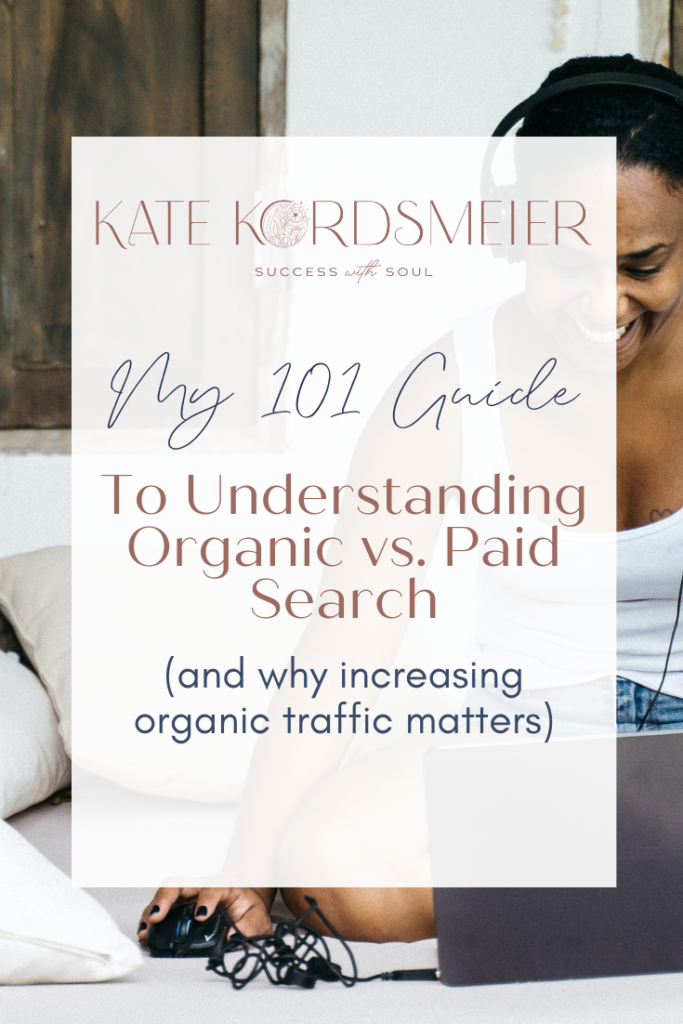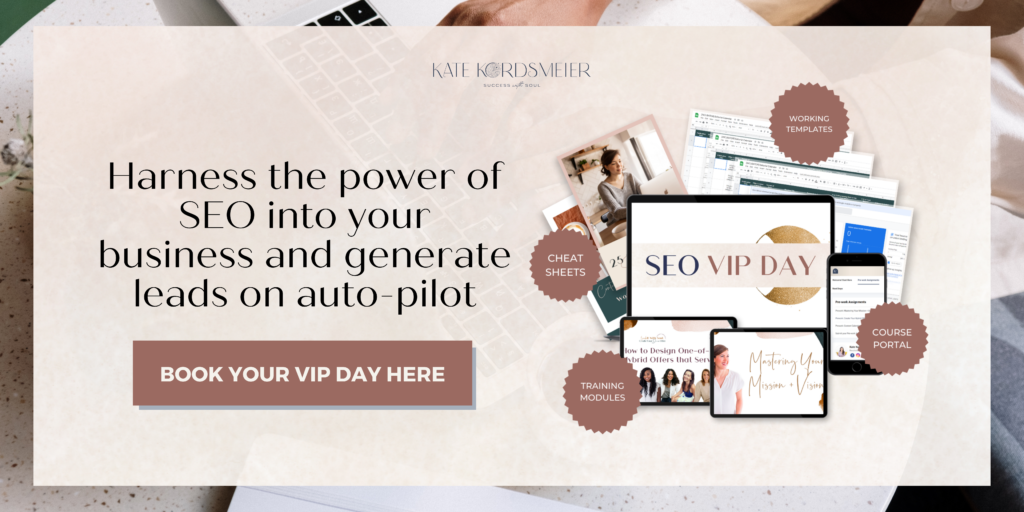Learn my secrets to creating a successful online business with my holistic strategies and soulful marketing advice for heart-centered entrepreneurs who value relationships, mindfulness, spirituality and health as much as strategic action and practical tips.
LEARN MORE →
Success with Soul Incubator
Success with Soul Shop
Launch Your Dream Offer Mini Course
Our most popular posts to help you create, grow and monetize your online business with soul!
EXPLORE POSTS →
Income Reports
Passive Income
Increasing Traffic
Why increasing organic traffic matters: Understanding organic vs paid search
November 2, 2022
Kate Kordsmeier
Hi, I’m Kate
Working mom, writer, educator and creative entrepreneur.
LEARN MORE →
Learn how to make money WITHOUT social media
free to join →
Explore a few of our favorite topics
INCREASING TRAFFIC
PASSIVE INCOME
INCOME REPORTS
Want weekly accountability + coaching?
Join our mastermind, The Room, the most powerful hour of your week. Clients who show up for these calls get better results faster—period. With weekly live coaching calls and monthly Get it Done Weeks, you'll actually (finally!) make progress in your business.
START FOR JUST $7 →
A holistic system for aspiring coaches, course creators + heart-centered entrepreneurs. Learn how to launch your business, launch your website and launch your offer(s), even if you have no idea where to start. Only $9!
READY FOR YOUR DREAM?
The Mindful Business Academy
Your All-Access Pass to a social-free, six-figure+ biz
LEARN MORE →
Last Updated on November 15, 2022
Ever wondered about the differences between organic vs paid search? This post covers the basics of both — and why increasing organic traffic is the best for online businesses.

Table of Contents
Organic vs paid search — what’s the difference?
There are two main types of website traffic: organic traffic and paid traffic.
In a nutshell, organic traffic is any traffic that comes to your page via search results in a platform like Google (Google is the most widely recognized, and largest, by far, but there are several others). So someone types in your name, your business name, or some keyword associated with your business into the search bar, your website shows up in the search results, and they click on your link.
Paid traffic is anyone who winds up on your site as the result of promotions or advertisements that you’ve paid for. Google ads and Facebook ads are the two most common forms of paid traffic.
So organic search generates organic traffic, and paid search generates paid traffic.
Today we’re going to look at the differences between organic vs. paid search, the perks and challenges of each, and why increasing organic traffic is one of the best things you can do for your online business.
Paid search 101
As mentioned above, paid search refers to all of the traffic that comes to your site via advertising that you pay the search engines for.
As one part of an overall strategy, paid search can be an effective way to get traffic to your website in the right context. But don’t believe the myth that paying for traffic is the ONLY way to run a successful online business.
Too often, when choosing between paid traffic or increasing organic traffic, I think entrepreneurs get stuck thinking that paid search has to be a bigger portion of your strategy than it actually needs to be.
Let’s compare organic vs paid search, and you can decide for yourself if paid search will be a helpful addition to your online biz toolbox.

Paid Search Perks
Paid search ads can be well targeted to your ideal client.
You’ve probably noticed by now that the search engines seem to follow you around the Internet, reading your mind and showing you ads for exactly what you’ve been looking for.
This is the power of the algorithms the search engines have built to get to know us, sometimes seemingly better than we know ourselves. Let’s set aside for a moment the totally-invasive-creeper vibe of all this, and focus on the good it can do…
Like most consumers, I don’t exactly love seeing ads everywhere, especially when they interrupt something I’m trying to get done.
But Google’s algorithms at least do me a favor by getting to know me and filtering out all the stuff they know I don’t care about. Yes, the ads might be interrupting me … but at least they’re pretty good at knowing how to interrupt me with stuff I might actually be interested in.
These highly-refined algorithms can work for you in the same way: helping you find your ideal clients and getting your message to them about how you can help them.
The details of how this is all done is WAY too much for this article, but to put it in very simple terms — you tell the search engine as much as you can about your ideal client, and the search engine finds them and shows them your ads.
I would suggest that it’s still easier to put your energy into increasing organic traffic to your website — more on that later — but for paid ads, the more you know about your ideal client, the better targeted your ads will be and the better your ROI will be.
Paid search is by default more visible
When someone types in a query on a search engine, the results at the very top of the page are the paid ads. You’re the first thing they see, and overwhelmingly, those first results are what get clicked on.
The top 3 results on Google search engine results pages (SERPs) receive over half (55.2%) of all traffic, and most of that comes from the first result.
The first result gets 28.5% of all clicks. The second result gets 15.7% of clicks — about half of the first. It’s clear from these numbers why that first spot is so coveted!
Paid search can be a temporary short-cut to search engine success
You can see from the numbers above that getting your website in that first, or even second position, in front of your ideal client, can have HUGE returns.
Increasing organic traffic is a slower-and-steadier process to get to these top search positions (and you’ll never get to the very top with organic search — remember, that’s reserved for paid ads).
When you pay for these positions, you can get to the top much faster, resulting in quick wins which can be a great way to bring in revenue while you work on increasing your organic traffic.
In this way, paid traffic can be a useful supplemental tool in your overall strategy.
Paid Search Challenges
Paid search can be highly competitive and very expensive
Online advertising can be highly competitive, and the more competition there is, the more expensive it gets. You might find yourself in a bidding war with your competition for that top spot on Google and end up spending a lot of money to get there, or get left in the dust because you can’t afford to compete.
You can (and should) set a budget, meaning your ads will stop when you’ve reached a certain threshold, so you won’t be charged more than your budget. And unfortunately, it’s very possible to not see any real results before you reach the end of your budget.
Remember, with paid search you pay for every single click. Someone accidentally clicks your ad — you pay. Someone clicks your ad and leaves your site without taking any action — you still pay.
I say this to highlight again the importance of knowing your target audience well AND the importance of nurturing those people when they click on your ads and find their way into your world. With an ad, you don’t have much time or space to show them that you understand them and can help them.
So when they do land on your site, you want to be ready for them — with on-target messaging, valuable free content, and free offers to get them into your ecosystem. Then, you keep nurturing them through your evergreen email funnel — and evergreen funnels + organic traffic are, in my opinion, a match made in heaven.
Paid search only delivers results as long as you’re paying
Unlike a great organic SEO strategy that continues to build on itself and become more and more effective over the years, paid search only works for you as long as you pay. If you stop buying ads, you’ll lose your position.
Paying for ads can help to boost your organic search results, but only when it’s part of a well-rounded SEM (search engine marketing) strategy that includes paid and organic SEO strategies.
Consumers have caught on and many overlook ads
Most people love to buy, but the idea of being “sold to” turns many people off. Ads put people on the defensive. They often don’t feel genuine or trustworthy. And we’re living in an environment that is so hyper-saturated with advertising that in some ways, consumers have become numb.
When the average person is being exposed to between 4,000 – 10,000 ads per day (!!), it can become like white noise. A lot of people scroll right past.
HOWEVER, some people who skip the top ad section do pay close attention to the top organic results. Why? Because they understand that that ranking has to be earned.
Bottom line when it comes to paid search
The bottom line is that paid search can be a great part of the overall search engine strategy for many businesses, but not necessarily every business — and it is not, in my opinion, a wise strategy to rely on.
When it comes to the question of organic vs. paid search, I’ll always encourage online business owners to focus more effort and attention on organic search strategies and increasing organic traffic to their websites.
Let’s look more closely at why I say this.
Organic search 101 + why increasing organic traffic is the best strategy for your business
Below I’ll cover some of the perks and challenges of organic search — and why I think increasing organic traffic is where most online businesses should focus more of their energy.
Organic Search Perks
You can target your ideal client with your organic SEO
Just like your paid advertising, your organic SEO should be tailored to your target market. Every piece of content you produce should be crafted with your ideal client in mind. It should speak to their struggles, hopes, dreams, desires — like you’re reading their mind and giving them exactly what they want and need.
One major benefit of increasing organic traffic is that organic traffic is already warm.
That means that they came looking for YOU, not the other way around, so they are better leads.
Organic Search Improves Longevity
When you’re successfully increasing organic traffic, you don’t fall off the face of the (Google) earth as soon as you stop paying for ads. The effort that you put in today to improve your search status will build momentum that will continue to move you up in the search engine rankings, even if you turn your attention to other things for a bit.
And Google loves longevity. In fact, Google rewards it. Like a fine wine or a wise woman, Google recognizes the value of good things that have stood the test of time.

It’s much less work to maintain + run
Your organic SEO can’t run solely on auto-pilot, of course, but increasing your organic traffic over time will require much less attention and work on your part to maintain once it’s up and running.
Paid ads are pretty damn high maintenance. You constantly have to be monitoring and looking through analytics and be ready to pivot in your strategy if something isn’t working. And because you have such a limited window, you can’t really let an ad sit there if it’s not performing, because that’s time and money lost.
Increasing organic traffic to your site also works as a perfect complement to an evergreen sales funnel. Together, they allow you to build a more hands-off business so that you have the freedom to work and rest and honor your natural, feminine cycle.
Increasing organic traffic is already built into the cost of your biz
Building a solid strategy for increasing organic traffic isn’t “free” — but it’s a hell of a lot more sustainable than relying on paid search.
Yes, you’ll still have the underlying business costs — hosting your website, the time you put into generating solid and targeted content, and any apps or software you might use to improve your search engine performance (we love UberSuggest and RankMath).
But these are costs that are not additional in the way that relying on paid search is. They’re built into what you would and should already be doing for your business.
Organic Search challenges
Yes, it’s a longer game
Unlike with paid advertising where you can get quick (but temporary) results, organic SEO is a long game. You need patience, and you have to understand that this is part of a sustainable growth strategy.
Ranking on page one of the search engines for certain keywords can take months, sometimes years, and with some keywords it’s impossible for small businesses to get on page one due to the competition (for example, imagine how hard it would be to beat out Starbucks for Pumpkin Spice Latte.)
BUT — there are also clever ways to build momentum that don’t involve trying to beat out the big guys. And the good news is that a solid all-around SEO game works beautifully in concert with all your other essential strategies: evergreen email marketing funnels, an irresistible digital offering, and high-quality free content.
Without continued care, you can lose your ranking
While organic search traffic does have longevity, and it’s much more hands-off than trying to manage paid ads — it is still possible to slip backwards in rankings. Like anything in your biz, it needs a little love to keep growing.
No matter where you are in the search engine rankings, you still need a plan for monitoring and maintaining your organic SEO strategies to make sure that you’re headed in the positive direction, and to adjust as needed.
I’m a big fan of nurture, nurture, nurture.
That happens in your blog content. It happens in your evergreen email strategy. And it happens in the background as you’re diligently increasing organic traffic with a solid SEO strategy.
Remember E-A-T for increasing organic traffic + attracting high-quality leads
The acronym E-A-T stands for:
Expertise of the content creator.
Authoritativeness of the content creator, the content itself, and the website.
Trustworthiness of the content creator, the content itself, and the website.
These are the three big factors that Google looks for in a website in order to determine where it deserves to rank in the search engines results.
When you’re consistently sharing great content online, and following best practices for the technical aspects of SEO, you will slowly but surely start to climb up in the search engine rankings.
Great content, according to Google’s guidelines, should be:
- helpful
- created by an expert
- posted on an authoritative site
- trustworthy
- updated regularly
You can do this (even if you’re not a “techie”!)
The technical side of SEO does take a little time to master, but it’s totally do-able. Entrepreneurs I think sometimes feel intimidated if they don’t feel like they’re “techie” enough, but I have a different way of framing it.
Think of all the things a business owner has to learn in order to be able to run an online company effectively — all kinds of new platforms, marketing, team building, strategy, efficient systems, etc.
Learning SEO isn’t any more complicated than these other areas of business operations. It might be different than what you’re used to … but it’s something that with the right help, you can get on top of fairly quickly.
If you know you want in-depth support, we cover all aspects of rock-solid SEO inside the Success with Soul Incubator.
AND — if you want some super-concentrated help with your SEO strategy to help you get rolling and build some real momentum — then check out my SEO VIP Day offering below.

I’m opening up 3 spots — and 3 spots only! — for a 1:1 VIP Day.
Each day is $3,000 — which includes guided prep work so we can hit the ground running, 4 hours of concentrated coaching, plus a follow up call to troubleshoot. This is for you if you want:
- focused help with your SEO
- the kind of guidance that can build real momentum
- help dialing in the art + science of increasing organic traffic to your website
- to stop treading water or feeling paralyzed by not knowing what to do next
A VIP Day is a perfect solution if you know you need a powerful injection of coaching and know-how, but you’re not quite ready (yet!) for a longer-term program.
You can learn more and book here.
Frequently Asked Questions About Increasing Organic Traffic to Your Website
I want to learn in-depth the differences between organic vs paid search and how to start increasing organic traffic to my website. Where can I do that?
Inside the Success With Soul Incubator, we spend an entire year helping you create the business of your dreams — including how to set up a rock-solid SEO strategy your can rely on. With 1:1 coaching, instruction, and an amazing supportive community, you’ll learn how and when to selectively incorporate paid search while you’re also steadily building organic visibility online.
In addition, we cover evergreen sales funnels, creating your ideal digital offer, business mindset, and how to build a business that is fueled by rest, not hustle.
What if I just need a quick jolt of help with SEO to build my momentum?
Then you need an SEO VIP Day with me! This is concentrated coaching that is 100% dedicated to YOUR personal, customized SEO strategy. Learn the basics, get set up, begin increasing organic traffic to your website, and start to see a real ROI as momentum builds.
This post may contain affiliate links. Read about our privacy policy.
Just Between Us 🤫
There are juicy deals and insider-only offers that I share only with my email community. If you love a good behind-the-scenes peek, let’s make it official and get you on the Whole Soul List, a sacred pause for heart-centered, ambitious entrepreneurs. See what it's truly like to unsubscribe from the status quo and create a life and business on your terms.
IT'S MORE THAN A LIST; IT'S A MOVEMENT!
Leave a Reply Cancel reply
Where are you in your business?
I don't have a biz yet + don't know where to start, but know I'm meant for more!
SOUNDS LIKE ME! →
I'm busy and overwhelmed, desperate for work-life balance
Yes! Tell me more →
I have an online business and want to sustainably scale without social media.
I’m so ready for this →
FEELING OVERWHELMED?
There’s only one way to eat an elephant (hint: one bite at a time!) and our 30-step roadmap to starting an online business will help you check things off your to do list like a pro!
YES, PLEASE!
JOIN US ON SKOOL
Join our client/student-only, social-media-free VIP Soul Circle on Skool to connect with other heart-centered entrepreneurs on the path to success with soul!
JOIN OUR free COMMUNITY →
EVERYTHING
about
THE SHOP
AFFILIATE PROGRAM
resources
the blog
THE podcast
Your New Sunday Ritual: the Whole Soul List newsletter
COPYRIGHT © 2024 • SUCCESS WITH SOUL LLC
Subscribe →
We are an LGBTQIA-affirming, interfaith-oriented, diverse organization. We are committed to social and environmental justice, including civil rights, dismantling systems of oppression like the Patriarchy, White Supremacy and Diet Culture. We believe Black Lives Matter.
login
Great post! Understanding the difference between organic and paid search is key. Your insights on the long-term benefits of organic traffic are spot on. The analogy of a marathon vs. a sprint drives the point home. Thanks for the valuable tips – a must-read for anyone serious about online success!